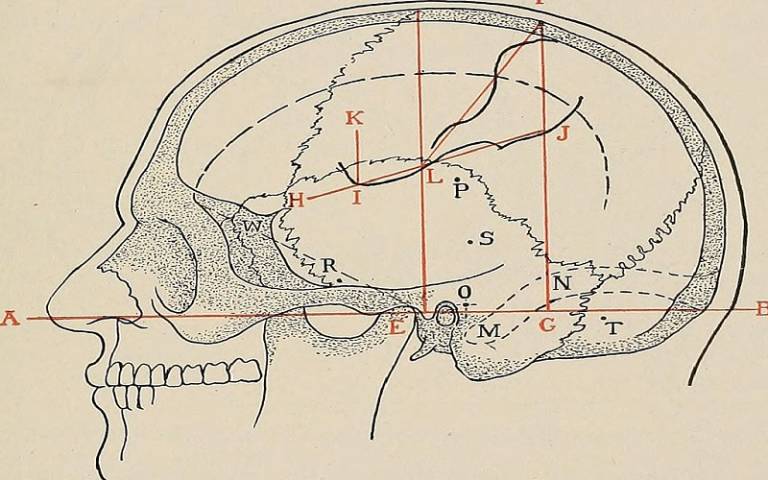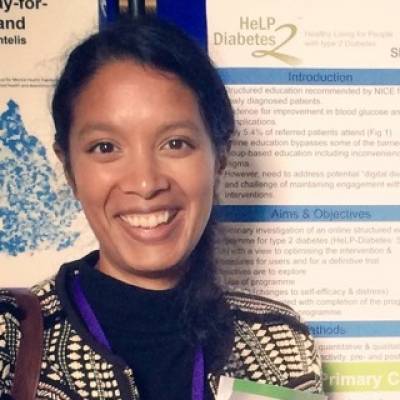Podcast: If I want to go into Neurosurgery, do I have to start out as an ordinary doctor?
In part one of a two part medical special, Dr. Shoba Poduval walks us through the career path to become a neurosurgeon.

9 April 2024
Image credit: Wikimedia Commons
TRANSCRIPT
ROBERTA LIVINGSTON
Hello and welcome to Ask The Expert, where you ask the questions and UCL’s finest experts answer them. I’m your host Roberta Livingston, a schools engagement assistant at UCL East. In this episode Dr. Shoba Poduval is back and this time round she is answering a two part question submitted by one of our listeners. And the question is ‘If I am good at maths and biology and I want to go into neurosurgery and science, do I have to start out as an ordinary doctor, I’m also interested in Pathology, where do I start with this?’ Now these are two brilliant questions to delve into so what we have done is split them in to two parts. This episode will focus on how to get into neurosurgery and the next episode will focus more on Pathology. So, let’s hear what Dr. Shoba Poduval has to say, shall we?
DR. SHOBA PODUVAL
Hi everyone my name's Shobha Poduval. I'm an academic GP at UCL, which means I spend some of my time seeing patients at my GP practise in North London and some of my time doing research and teaching and talking to the public as a researcher at UCL. And I'm here today to answer two questions about medical training. So the questions are, if I'm good at maths and biology and I want to go into neurosurgery and science, do I have to start out as an ordinary doctor? I'm also interested in pathology, where do I start with this?
So there's are really good questions. Medical training is quite complicated so it's not that easy to understand for people who are in the system. So I'm going to talk about Neurosurgery first and then Pathology. And I'll explain what those jobs involve and how you need to train, and whether you need to be a doctor first because they're both slightly different.
So first of all, Neurosurgery, just to explain in simple terms what it is for people who don't know, the neurosurgeons are involved in diagnosing and treating people who have problems with their nervous system and the nervous system exists throughout the body, but you could split it into two bits that's central and peripheral, and the central nervous system consists of the brain and the spine and the peripheral nervous system includes all your nerves that send the messages out from the brain and the spine to your muscles and your arms and legs. And it's a mixture of medical and surgical speciality. It's mostly surgery, but you do spend time on the wards looking after your patients before and after their surgery too. You see patients of all ages. It's quite a broad range. You can see adults and children and the kinds of things that you would treat as a neurosurgeon include things like trauma. So say, for example, if someone's been in a car accident or a fall from a building and they've had a head injury and which has caused for example, a bleed on the brain that's something a neurosurgeon would treat. Also, things like brain tumours. So cancers, strokes, which are when you either have a blood clot or a bleed in one of the blood vessels in your brain and then that can paralyse one side of your body and also things like aneurysms which are again bleeds and burst vessels in the brain which can lead to really severe complications like part of your body being paralysed
or even death.
As you can imagine, if you're dealing with those kinds of problems, it's a very demanding job. And it can involve really long, complicated operations. So one of the attractions of the specialty, I think is the surgery and the really interesting problems that you deal with. But that could also mean that the procedures are very complicated and very high risk as well. So for example, if you're operating on someone's brain, you're dealing with very small areas and if anything goes wrong, it can lead to really serious long lasting impacts on that person and you're not only in surgery, you're also, as I said earlier, looking after your patients on the wards and you're looking after their families as well. So explaining to families when patients come into hospital and then when they have surgery, what's happening and what they can expect.
And you, you spend a lot of your time dealing with emergencies. So because neurosurgeons are so involved with trauma, accidents, that kind of thing.
You spend a lot of time working long hours during the week, but also evenings and weekends. You can often be on call, which means you get called in if there's a particular emergency that's relevant to you, but it is also a very rewarding speciality. It really can save lives, it can save people from being in a wheelchair, it can save people from not being able to feed themselves, dress themselves. All of those sorts of things, and you get to work with a really big, diverse team. So you'd work with physios and speech therapists, nurses, obviously, other types of doctors.
A typical day for a neurosurgeon, it starts quite early. This is the thing for all surgical specialties. I'm afraid you're right. You're in early at sort of 7:30 getting ready to go into theatre essentially because you need to start your surgical list in theatre quite early in the day. You spend most of your day in in theatre doing operations, but you also have to do ward rounds with the rest of your team, your junior doctors and nurses to make sure the patients coming in and out of surgery are OK. And the day generally ends quite late in the evening, so between sort of six and nine typically. And as I said earlier, working nights is common.
Because, as we know, accidents can happen at any time of the day, so you just don't know when you're going to get called in, and there has to be cover round the clock.
So it is a very demanding speciality and it requires skills like good decision making, working well under stress. A good use of your hands, obviously, to do all those operations and physical tasks, but also good time management and organisation because you're going to be really busy and managing lots of patients. Confidence and also being emotionally resilient as well because you're dealing with these really high risk cases. Some of which don't always go well, and you have to deal with the family, and it can be really emotionally challenging as well.
So how do you get into neurosurgery? If this is still sounding like something you want to do, then your first step is obviously starting at school, so you'll need excellent GCSEs and three or three A's or three A stars. So a combination of those at a level in you need to include chemistry in that in order to be able to apply for medicine. That was the case when I applied it still is now unfortunately, because it comes in really handy for those first that first year and 2nd year where you're studying biochemistry and Physiology and pharmacology and that kind of things.
Some medical schools also ask for biology at a levels and others may require maths or physics. So it's really dependent on your medical school. So have a look.
The different medical schools and their requirements, they usually tell you on their websites or you can find out through UCAS, so you know what you're aiming for.
Medical school is between five and six years. Again, depending on the medical school at UCL is 6 years and you do an intercalated BSc, so you get 2 degrees at the end of your six years. Once you've finished medical school, you join a two year foundation programme and you do six months placements in different settings. So for example for my placements I did intensive care and respiratory medicine. I then did A&E in my foundation year 2 and Psychiatry, so there's different combinations that you can do in those two years after your two year foundation programme, you need to apply for speciality training to become a neurosurgeon and that takes a minimum of eight years.
So it's a long road and the reason for that and the reason why you can't do it without becoming a doctor is because you need all that knowledge and experience to be able to get to the point of being a consultant neurosurgeon who can lead in these really complex operations. So it might seem like a long time to be able to get to the point where you're doing things you want to do, but actually.
The pathways really enjoyable and interesting, and you'll get a lot out of it.
So at medical school, you learn a lot. You meet loads of people, you get really interesting experience. Then as a junior doctor, both in your foundation programme and in your speciality training, that's where you pick up all your skills and your experience. So you're learning how to do procedures. You're learning how to talk to patients, how to assess patients, how to diagnose them, how to work under pressure.
And you get lots of supervision as a junior doctor, particularly in those early foundation years. So you're really well supported initially and then you become more and more independent as you progress along that training pathway. So it is really important that you have a number of years as a junior doctor first.
And some other facts about neurosurgical training competition is extremely high, so looking at the numbers, I've got data from 2019 which shows that there were 157 applications for neurosurgery, speciality training from foundation programme doctors and only 24 posts. There's no guarantee either that you'll get onto a neurosurgical training pathway and once you're on the pathway, there are more exams.
And this is the case for all medical specialities, I'm afraid I have to do these as a GP as well.
So we all have to sit exams for membership of the Royal College. So for neurosurgery, it's membership of the Royal College of Surgeons. And you need to do that after ST 2, so you do speciality training is one and two and then to progress to the year 3 you have to do these exams and they consist of a 5 hour written exam and a practical exam. And again that's the case for all medical specialities. So as a GPI had to sit an MCQ and a practical exam to be able to complete my training. So the exams don't end at medical school, I'm afraid they keep going throughout the training.
So that's neurosurgery and hopefully that gives you an idea of of what you need to do. Essentially, yes, you do have to start as an ordinary doctor.
ROBERTA LIVINGSTON
And so there you have it! Pursuing a career in Neurosurgery is a long road ahead but in the end it can be so rewarding when it comes to helping people.
And that is the end of this episode, I hope it was helpful! As mentioned at the beginning, part two of this episode with Dr. Shoba Poduval will focus on Pathology, so please do come back for that! If you wish to submit your own question for an expert to answer just type in Ask The Expert UCL on your search engine and our website should be the first to pop up.
Til next time! Thank you.
 Close
Close


